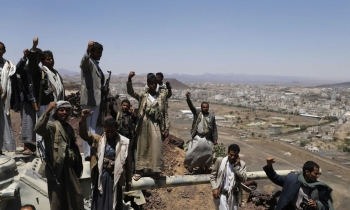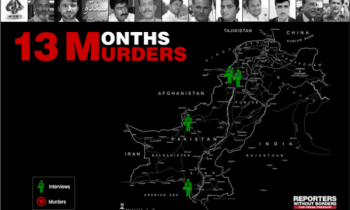Since violence erupted in Israel and the Occupied Territories in late September, Palestinian radio and television have covered events with their own unique spin. On the government-run Voice of Palestine, Palestinians who die in clashes are described as "martyrs" and funerals are covered intensively. Israel, meanwhile, is deemed "wicked," and Prime Minister Ehud Barak is routinely referred to as a "war criminal."
The Israeli government calls such broadcasts "incitement to violence" and on October 12, after two Israeli reservists were lynched in the West Bank town of Ramallah, a helicopter gunship blasted two of the station's transmission towers, briefly knocking it off the air. A month later, Israeli forces bombed a Palestinian government television station in Gaza along with other targets in retaliation for a bloody bomb attack on an armored school bus.
Palestinian radio and television stations are not the only broadcast facilities to have been targeted in recent conflicts. In August 1999, Russian forces moving against Chechen rebels in the republic of Dagestan bombed radio and television stations they claimed were operated by Islamic militants. A government spokesman said the stations were "warned on more than one occasion that the broadcasting of open propaganda was impermissible and illegal."
A few months earlier, in an incident that Israel cited as a precedent for its attack on Palestinian broadcasters, NATO forces launched a deadly attack against the studios of Radio and Television Serbia (RTS) in Belgrade, killing sixteen people. Weeks before that attack, a NATO spokesman had described the station as "an instrument of propaganda and repression [and] therefore a legitimate target in this campaign." It is not hard to understand why the NATO generals were angry at RTS. Video images broadcast on the station depicted U.S. Secretary of State Madeleine Albright as a witch surrounded by burning flames, and showed Bill Clinton metamorphosing into Hitler.
There's only one problem: bombing a broadcaster because of what it puts on the air is a violation of international humanitarian law, which military forces are bound to comply with. At the heart of that law are the 1949 Geneva Conventions and additional protocols. Article 52 (2) of Additional Protocol I states, "Military objectives are limited to those objects which by their nature, location, purpose, or use make an effective contribution to military action and whose total or partial destruction, capture or neutralization, in the circumstances ruling at the time, offers a definite military advantage." It is extremely difficult to argue that every enemy propaganda network meets this test.
Consider, for example, the role that RTS played during the Kosovo conflict. While Slobodan Milosevic's propaganda machine helped fuel the terrible ethnic violence during the wars in Croatia and Bosnia by exaggerating or even inventing attacks against Serb civilians (and by reporting that Muslim and Croat forces had deliberately bombed their own civilians and then blamed the Serbs), RTS did not stir up animosity toward ethnic Albanians in Kosovo. In fact, the station largely ignored the conflict there, reporting only that Albanian "terrorists" were on the run from Serb forces. After the NATO bombing began in March 1999, RTS continued to play down the situation in Kosovo, but did report that ethnic Albanians loyal to Milosevic were fleeing the province because of NATO bombs.
What seemed to particularly anger NATO officials were daily reports broadcast on RTS about NATO planes being shot down, NATO pilots being killed, and massive protests against NATO's "criminal aggression" in cities around the world. RTS also provided dramatic footage of the devastation wrought by errant NATO bombs, and international media incorporated this footage into reports filed from Belgrade using RTS facilities.
Certainly, RTS's programming during the Kosovo conflict was offensive, biased, and false -- but it did not play a direct role in Milosevic's military effort. In the aftermath of the war, NATO officials admitted as much. In an interview, NATO spokesman Michael Phillips insisted that RTS was targeted not because of what it was broadcasting but rather because the station was integrated into "military command and control."
Disseminating propaganda, Phillips said, is not a military function. "The Geneva Conventions provide protection to civilian institutions;" however, "if these institutions are used for military purposes they lose that protection and become legitimate targets."
Such revisionism is unconvincing, and in a June 2000 report Amnesty International described the attack on RTS as a war crime, noting that "NATO must have clearly anticipated that civilians in the RTS building would have been killed."
Lawyers for the victims' families later announced that they had uncovered documents in the RTS building demonstrating that RTS management had known the exact date and time of the NATO strike twelve hours before it took place: instead of evacuating the station, RTS managers had ensured that the staff would be present during the overnight shift in an apparent effort to maximize casualties. But Belgrade's cynical and callous effort to win a propaganda victory does not absolve NATO of its legal responsibility to ensure that the targets selected for attack conform to the laws of war.
Although international humanitarian law prohibits an attack on an enemy broadcast facility because it is broadcasting propaganda, it is equally clear that the laws of war permit such an attack if the station is used for military purposes, such as military communication. The most glaring recent example is the use of civilian radio by the Hutu-led military junta in Rwanda to coordinate and carry out a genocidal campaign against ethnic Tutsis in 1994. As a 1996 report published by the British anti-censorship group ARTICLE 19 documents, Radio-Télévision Libre des Mille Colline (RTLM) was created by people with close ties to the Hutu-led junta for this express purpose. RTLM served as a vital communication link between the junta leaders and the militias that carried out most of the killings; individuals who were identified and denounced during broadcasts were hunted down and executed. The station may have also relayed information to militia members and government troops fighting the Tutsi rebels.
Because of the nature of the broadcasting on RTLM, there is no question that knocking the station off the air served a significant military purpose. The April 17, 1994, attack on the broadcast station by Tutsi forces conformed to the laws of war, and had the United Nations forces that were present in Rwanda intervened militarily, RTLM would have been a legal target.
The situation in Israel and the Occupied Territories is extremely complex, but a careful examination of the programming on the Voice of Palestine and Palestinian television suggests that, while some of the broadcasting is unquestionably disturbing, the stations have not been used for military purposes. Most of the programming on Voice of Palestine consists of news headlines and reports interspersed with martial music, as well as interviews with Palestinian officials. There have also been unconfirmed reports that the Voice of Palestine has broadcast falsified accounts on Israeli atrocities. The most inflammatory broadcast followed the mob lynching of two Israeli reservists in Ramallah; Palestinian television broadcast a live sermon by Sheik Ahmad Abu Halabaya, urging Palestinians to rise up against Israel. "Have no mercy on the Jews," said Halabaya, according to an English translation disseminated by a pro-Israeli monitoring group. "Wherever you meet them, kill them."
Israeli outrage at such a sermon is not surprising. But international humanitarian law is clear that an any attack on a broadcasting facility must be based on a careful determination that the station is serving a significant military function. If military commanders feel they can attack broadcasting facilities because they are offended or outraged by what they are putting on the air, then no journalist anywhere is safe and the ability of the press to cover conflict will be deeply compromised. Journalists play a vital role in modern warfare -- often they are the only civilians present on the field of battle. They are therefore in a unique position to inform the public about the conflict, and to make public violations of the laws of war. Because of this critical role, any government that purports to uphold the rule of law and to respect press freedom should refrain from attacking broadcast facilities unless it can demonstrate -- convincingly and publicly -- that they are being used for military purposes. Otherwise, what will prevent some future Milosevic from taking out CNN?
Joel Simon is the deputy director of the Committee to Protect Journalists.









